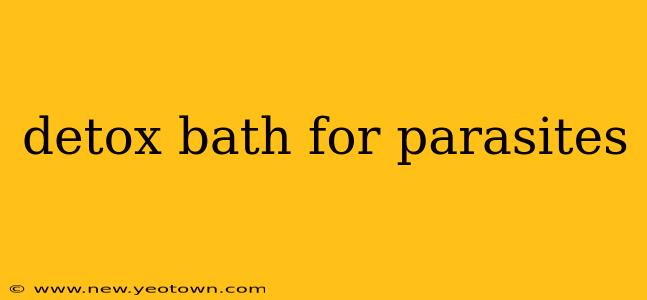Banishing the Bugs: A Deep Dive into Detox Baths for Parasites
The human body is a complex ecosystem, and sometimes, unwelcome guests—parasites—can disrupt its delicate balance. While a detox bath isn't a magic bullet for parasite removal, it can be a supportive element in a holistic approach to parasite cleansing. This isn't a replacement for medical advice; always consult your doctor before starting any new health regimen, especially if you suspect a parasitic infection.
This journey into detox baths for parasites will unravel the science behind them, address common concerns, and provide a balanced perspective on their effectiveness. Let's begin.
What are Parasites and How Do They Affect the Body?
Parasites are organisms that live on or in a host and benefit at the host's expense. Imagine uninvited houseguests—they take resources and cause disruptions. These tiny invaders can range from microscopic protozoa to larger worms, each wreaking havoc in its own way. Common symptoms of parasitic infections can include digestive issues (diarrhea, bloating, stomach cramps), fatigue, skin rashes, and weight loss. The severity depends on the type and number of parasites, as well as the host's overall health.
Can a Detox Bath Actually Kill Parasites?
This is a complex question. A detox bath itself won't directly kill parasites living inside your body. The skin acts as a barrier. However, the Epsom salts and other ingredients often included in these baths can offer supportive benefits. Epsom salts (magnesium sulfate) are known for their ability to draw toxins from the body through the skin, potentially aiding in the removal of parasite byproducts. Essential oils like tea tree or oregano, often added to detox baths, have antimicrobial properties that might help reduce external parasitic infestations (like scabies or lice).
What are the Ingredients in a Detox Bath for Parasites?
Typical detox bath recipes for parasites often include a combination of:
- Epsom Salts: For their magnesium content and purported detoxification properties.
- Baking Soda: To help alkalize the bath water and potentially soothe irritated skin.
- Essential Oils: Tea tree, oregano, and thyme oils are popular choices due to their antimicrobial properties. Note: Always dilute essential oils properly; undiluted oils can irritate the skin.
- Colloidal Silver: Sometimes included for its purported antimicrobial effects. Note: More research is needed to verify the efficacy of colloidal silver.
How Often Should You Take a Detox Bath for Parasites?
There's no magic number. A general guideline might suggest 1-2 times a week, but it's crucial to listen to your body. If you experience any skin irritation or discomfort, reduce the frequency or discontinue use.
What are the Potential Side Effects of Detox Baths?
While generally considered safe, detox baths can cause some side effects, particularly if you have sensitive skin. These include:
- Skin Irritation: Some ingredients, especially essential oils, can irritate sensitive skin.
- Dehydration: Prolonged soaking can lead to dehydration, so ensure you drink plenty of water afterward.
- Dizziness: Soaking for extended periods can cause dizziness in some individuals.
Are Detox Baths a Replacement for Medical Treatment?
Absolutely not. Detox baths are a complementary therapy, not a cure. If you suspect a parasitic infection, you must consult a healthcare professional for proper diagnosis and treatment. They can perform tests to identify the type of parasite and prescribe appropriate medication. Self-treating parasitic infections can be dangerous and may delay effective treatment.
Beyond the Bath: Holistic Support for Parasite Cleansing
A holistic approach to dealing with parasites goes beyond detox baths. This might include dietary changes (eliminating sugary foods and processed foods), adopting a gut-friendly diet rich in probiotics, and considering herbal remedies under the guidance of a healthcare professional.
Disclaimer: This information is for educational purposes only and is not intended as medical advice. Always consult a healthcare professional before starting any new health regimen, especially if you suspect a parasitic infection.

